It’s the height of summer and Mind Set Art Center is bringing you Summer Time (夏日時光), a joint exhibition featuring works by several artists that are contemplative and lulling. As the gallery states: “We invite you to embrace art, to reset your mind and enjoy the…calmness that art brings.” Also, art galleries have air-conditioning. Included in the lineup is Mia Wen-hsuan Liu’s (劉文瑄) artwork that explores the psychological effects of traveling, which she likens to a constant reverie. Shi Jin-hua’s (石晉華) paintings and drawings are hypnotic in a different sense. A diabetic, his obsession with scales and measurements translates as a quest to seek scientific means to quantify human emotions. His lines and squiggles are haphazard and meticulous at the same time. Chinese artist Shi Jinsong (史金淞) is known for his bizarre and contorted sculptures which are meant to defy authority, but it’s his cool, simplistic Jiangnan Gray series, made with gray chalk and paint, that are on display at the gallery.
■ Mind Set Art Center (安卓藝術), 7F, 180, Section 1, Heping East Road, Da'an District, Taipei (台北市大安區和平東路一段180號7F), tel: (02) 2365-6008. Open Tuesdays to Saturdays from 11am to 6pm
■ Until Aug. 20
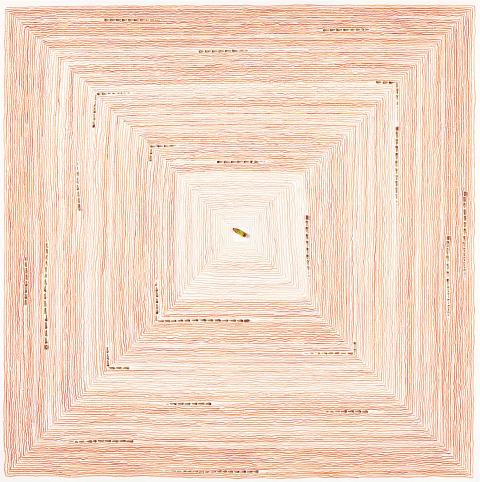
Photo courtesy of Mind Set Art Center
Held at the Kuandu Museum of Fine Arts, Analog Welcome, Digital Archive (類比開端·數位回溯) is an exhibition for those interested in the process of preserving, recording and archiving art. As uppity as it sounds, the exhibition raises important issues regarding methods of archiving and preserving the integrity art. For example, with technology constantly evolving, how do we preserve video art? If it is recorded on a DVD, but we no longer use DVD players, do we upgrade the artwork to USB or hold onto an old DVD player? It often depends on the artist — some don’t mind their artwork being tweaked, restored and upgraded, but some do.
■ Kuandu Museum of Fine Arts (關渡美術館), 1 Xueyuan Rd, Taipei City (台北市學園路1號), tel: (02) 2896-1000 X 2432. Open Tuesdays to Sundays from 10am to 5pm
■ Until Sept. 11
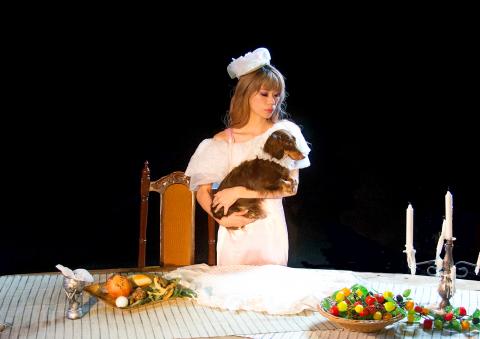
Photo courtesy of TFAM
The sculptures and installations of Paiwan artist Sakuliu Pavavalung, founder of the Guliu Handicrafts Workshop (古流工藝社), are currently on display at the International Pavilion of Indigenous Arts and Cultures in Taipei. The Spirit and Our Life: Umaq and Ancient Totems of Paiwan (靈與我們的生活:Umaq與排灣族古老圖紋的故事) focuses on the concept of umaq, which means “house” in the Paiwan language. Few stone houses remain in Taiwan, and Sakuliu pays homage to this kind of architecture through sculpture, painting and handicrafts. Inherent in Sakuliu’s artwork, which here includes stone houses and wooden and bronze sculptures of Paiwan tribesmen, is the struggle of Aboriginal tribes to pay homage to their heritage while also participating in modern society.
■ International Pavilion of Indigenous Arts and Cultures (原民風味館) 151, Zhongshan N Rd Sec 3, Taipei City (台北市中山北路三段151號), tel: (02) 2599-2655. Open Tuesdays to Sundays from 11am to 7pm
■ Until Sept. 18
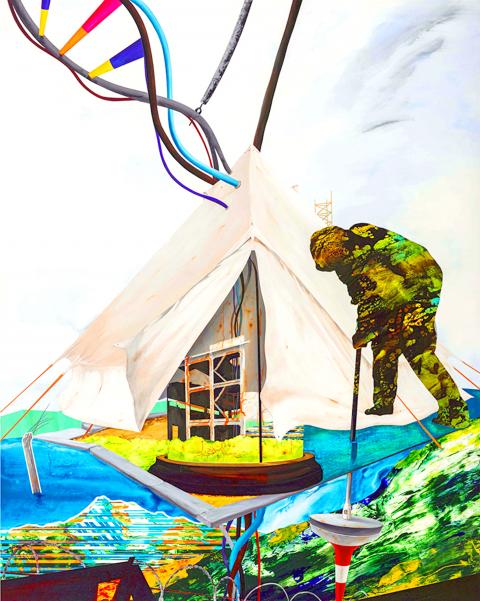
Photo courtesy of TFAM
For an artist whose work takes an apocalyptic view on the world and human nature, Chou Tai-chun’s (周代焌) paintings are uncharacteristically cheery. State of Flux (崩解劇場) is Chou’s exhibition at the Taipei Fine Arts Museum wherein a series of colorful paintings depict a bunch of possible narrative outcomes if Taiwan was to suffer a cataclysmic natural disaster. In all the paintings, the backdrop is a wasteland, and a clean-up crew armed with gas masks and rubber boots are trying to clear the waste, but to no avail. Chou says the March 11, 2011 earthquake and tsunami that hit Japan solidified his fatalistic view, reinforcing the belief that we are all pawns in nature’s game.
Also on display at TFAM is Wu Chien-hsing’s (吳建興) The Endless Ties of Love (情定終身). The exhibition is a video of what appears to be different groups of people at an extravagant banquet. Inspired by Wu and his wife’s wedding ceremony, the video brings to lights various points of contention, for instance, private vs public, relationships between individuals and between individuals and institutions, individuals and the state, modes of identification and the meaning of “home” — you know, just ordinary ruminations that come to mind when you think of your wedding.
■ Taipei Fine Arts Museum (TFAM, 台北市立美術館), 181, Zhongshan N Rd Sec 3, Taipei (台北市中山北路三段181號), tel: (02) 2595-7656. Open Tuesdays to Sundays from 9:30am to 5:30pm and until 8:30pm on Saturdays
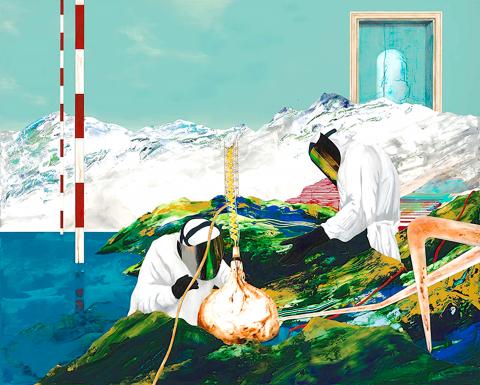
Photo courtesy of TFAM
■ Both exhibitions open Saturday and run until Sept. 25
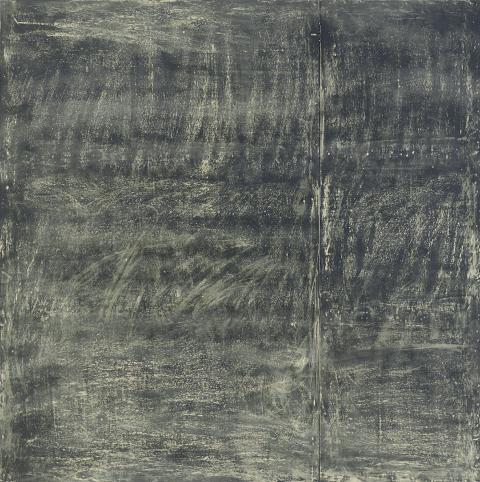
Photo courtesy of Mind Set Art Center

Last week, on the heels of the recall election that turned out so badly for Taiwan, came the news that US President Donald Trump had blocked the transit of President William Lai (賴清德) through the US on his way to Latin America. A few days later the international media reported that in June a scheduled visit by Minister of National Defense Wellington Koo (顧立雄) for high level meetings was canceled by the US after China’s President Xi Jinping (習近平) asked Trump to curb US engagement with Taiwan during a June phone call. The cancellation of Lai’s transit was a gaudy

Following the shock complete failure of all the recall votes against Chinese Nationalist Party (KMT) lawmakers on July 26, pan-blue supporters and the Chinese Communist Party (CCP) were giddy with victory. A notable exception was KMT Chairman Eric Chu (朱立倫), who knew better. At a press conference on July 29, he bowed deeply in gratitude to the voters and said the recalls were “not about which party won or lost, but were a great victory for the Taiwanese voters.” The entire recall process was a disaster for both the KMT and the Democratic Progressive Party (DPP). The only bright spot for

From Godzilla’s fiery atomic breath to post-apocalyptic anime and harrowing depictions of radiation sickness, the influence of the nuclear bombings of Hiroshima and Nagasaki runs deep in Japanese popular culture. In the 80 years since the World War II attacks, stories of destruction and mutation have been fused with fears around natural disasters and, more recently, the Fukushima crisis. Classic manga and anime series Astro Boy is called “Mighty Atom” in Japanese, while city-leveling explosions loom large in other titles such as Akira, Neon Genesis Evangelion and Attack on Titan. “Living through tremendous pain” and overcoming trauma is a recurrent theme in Japan’s

As last month dawned, the Democratic Progressive Party (DPP) was in a good position. The recall campaigns had strong momentum, polling showed many Chinese Nationalist Party (KMT) lawmakers at risk of recall and even the KMT was bracing for losing seats while facing a tsunami of voter fraud investigations. Polling pointed to some of the recalls being a lock for victory. Though in most districts the majority was against recalling their lawmaker, among voters “definitely” planning to vote, there were double-digit margins in favor of recall in at least five districts, with three districts near or above 20 percent in